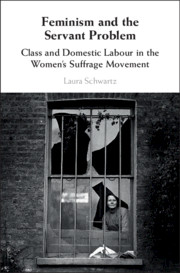Book contents
- Feminism and the Servant Problem
- Feminism and the Servant Problem
- Copyright page
- Contents
- Figures
- Acknowledgements
- Introduction
- 1 The ‘Servant Problem’ and the Suffrage Home
- 2 Servants in the Suffrage Movement
- 3 The Housework Problem
- 4 Domestic Labour and the Feminist Work Ethic
- 5 The Domestic Workers’ Union of Great Britain and Ireland
- 6 Servants and Co-operative Housekeeping
- Conclusion
- Select Bibliography
- Index
3 - The Housework Problem
Published online by Cambridge University Press: 19 July 2019
- Feminism and the Servant Problem
- Feminism and the Servant Problem
- Copyright page
- Contents
- Figures
- Acknowledgements
- Introduction
- 1 The ‘Servant Problem’ and the Suffrage Home
- 2 Servants in the Suffrage Movement
- 3 The Housework Problem
- 4 Domestic Labour and the Feminist Work Ethic
- 5 The Domestic Workers’ Union of Great Britain and Ireland
- 6 Servants and Co-operative Housekeeping
- Conclusion
- Select Bibliography
- Index
Summary
In this chapter, I argue that feminist responses to the ‘servant problem’ cannot be reduced to a narrative of selfish middle-class women refusing to share their new-found emancipation with their domestics. They must also be considered in relation to a wider problem of housework. Whether performed by a servant or a housewife, the burden of housework during this period was immense. Keeping a house involved a great deal of heavy manual labour, carried out in unhealthy conditions. Feminists argued that the housework problem affected, and indeed united, women across the classes, whether they were single or married, professional women or mothers. Housework was viewed not just as a practical problem, but also as a political issue. It was widely recognised that the all-absorbing and time-consuming character of housework prevented women from taking an interest in the world outside the home and especially from participating in movements for social and political change. Housework was also politicised by opponents of the suffrage movement, who fixated on domestic labour – or rather, women’s failure to do it – as shorthand for feminism’s destructive influence.
Keywords
- Type
- Chapter
- Information
- Feminism and the Servant ProblemClass and Domestic Labour in the Women's Suffrage Movement, pp. 90 - 119Publisher: Cambridge University PressPrint publication year: 2019

